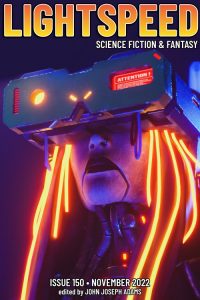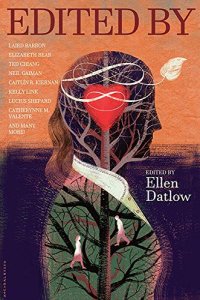Charles Payseur Reviews Short Fiction: Lightspeed, GigaNotoSaurus, and Reckoning: Our Beautiful Reward
 Lightspeed 11/22
Lightspeed 11/22
GigaNotoSaurus 11/22
Reckoning: Our Beautiful Reward 11/22
November’s Lightspeed features the wonderful novelette “The Noon Witch Goes to Sound Planet” by Kristina Ten, where Hailey is a young woman who doesn’t really want to be the Noon Witch, something she’s inherited from her mother, who used to give men heatstroke back in the old country. Hailey just wants friends and figures if she can spend the week at Sound Planet, an outdoor concert in the dessert, she might just convince everyone that she’s not going to give them sunburn… or worse. The story moves between humor and seriousness with equal skill, following Hailey as her plans sort of fall apart, but she might still win the day anyway. It’s a fun and entertaining jaunt.
I do have to reiterate my admiration for GigaNotoSaurus, which has had a stellar year while putting out only a single story a month. It’s a testament to quality over quantity, and November’s “Little Gardens Everywhere” by Avra Margariti is no exception. The story features Enoch, a human who was taken by the fae, and Jericho, the changeling child left in their place. And that dynamic defined them both for a long time, trapped them in abusive homes, and pitted them against each other. Against all odds, though, they found each other and found help to escape the cruelties they had suffered and start new lives together. After living a while in the city, though, they are called to confront their origins in order help someone like them – but can they face their collective trauma and return to a place they spent years escaping? Margariti does a moving and wonderful job building the world and the characters, showing the rough edges that pain and abuse have left, and the warmth that a hard life hasn’t managed to freeze or diminish. It’s a beautiful and expertly woven story about family, scars, and the power of giving and receiving help.
I’ll close things out with a look at a special issue from Reckoning, reacting to the news of the overturning of Roe v. Wade and the intense ramifications of that decision on the United States. Titled Our Beautiful Reward, the collection of poetry and fiction looks at anger and energy, the grim decline of personal freedoms, and how the decision fits into larger movements like climate change and ecological destruction. From the poetry, “Ghazal for freshwater – wai” by Laurel Nakanishi is about water – about wai – and what it can mean on Hawaii, contextualized by the United States military’s poisoning of community drinking water. It’s a piece that looks at promise, at the desire to leave resources and situations better for future generations, and finding instead that things are tainted or broken. That opportunities are lost, and that things that people need, from drinking water to freedoms, are too often taken away, leaving a clouded and twisted legacy for the future. Mari Ness examines life and plants in “Green Leaves Against the Wind”, which focuses on how some green and growing things have very different needs and so many ways to die. Ness captures the mental and emotional toll that comes from knowing that something is fragile and being expected to nurture it. Perhaps more, to be punished if the plant dies regardless, despite plants dying so easily for so many different kinds of reasons, for contradictory reasons, all of which layers on stress and burden that end up becoming another thing that plants might react poorly to. It’s an effective way of showing how impossible a thing life can be, how personal and individual, and how terrifying the world becomes when those in power and authority focus instead on universals that fail in so many ways.
Shifting to the issue’s fiction, and Rimi B. Chatterjee tells the story of a family strained to a breaking point in “A Question of Choice”. In it, a man reacts to a vicious violence done to him by retreating behind the safety of his gender and the place he feels he has lost in his culture. Over the objections of his wife, he comes up with a solution that will make male births much more common, “fixing” in his mind the evils of overpopulation and the moral degeneration he sees in the world. For his wife, though, and the women of his world who already suffer the capricious moods of men, the prospect is less than idyllic, and the piece explores need to take hard stances against attempts to put the control of births into the hands of those who don’t experience them. Chatterjee is careful in portraying no character as cartoonish, instead revealing the familiar faces of those who react to fear with authoritarian control. Finally, M.C. Benner Dixon tells a tender and complex story of expectations, bodies, and autonomy in “Those Dark Halls”. In it, some people are keepers, and develop chambers in their bodies that certain moths use to reproduce. It’s not something the narrator ever wanted, and from the start she wants to reject what she is constantly told is a “gift.” As she grows and these chambers open, she is faced with what she wants, and what it might cost her to insist that her body is her own, regardless of the expectations heaped on her by other people and regardless of people will judge her for controlling her body. The story mixes elements of body horror, societal stigma, and familial manipulation to great effect, leaving room for an ending that isn’t exactly triumphant, but is resilient and unbowed.
Recommended Stories:
“Little Gardens Everywhere”, Avra Margariti (GigaNotoSaurus 11/22)
This review and more like it in the January 2023 issue of Locus.
 While you are here, please take a moment to support Locus with a one-time or recurring donation. We rely on reader donations to keep the magazine and site going, and would like to keep the site paywall free, but WE NEED YOUR FINANCIAL SUPPORT to continue quality coverage of the science fiction and fantasy field.
While you are here, please take a moment to support Locus with a one-time or recurring donation. We rely on reader donations to keep the magazine and site going, and would like to keep the site paywall free, but WE NEED YOUR FINANCIAL SUPPORT to continue quality coverage of the science fiction and fantasy field.
©Locus Magazine. Copyrighted material may not be republished without permission of LSFF.








